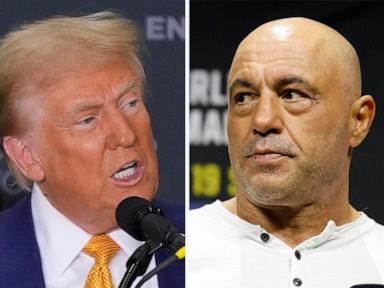Trump is repeating a history of propaganda, violence and hate

If someone runs for president of the United States while attacking the pillars of its democracy — the peaceful transfer of power and the rule of law — it may be confusing, as well as offensive and outrageous. But is it an effective political strategy? Could Donald Trump’s anti-democracy tactics be a conscious attempt to destabilize things enough to get back into power?
Whether or not they are deliberate, his actions are verifiably consistent with a historical pattern that has played out before, though this may be hard to see in light of how norm-breaking and unprecedented the former president’s actions seem.
Trump refused to accept 86 court decisions rejecting his claim that the 2020 election was illegitimate. He insults U.S. allies and affirms his trust of the leader of Russia, whom he said he trusted more than U.S. intelligence services. He pulled the U.S. out of the treaty prohibiting Russia from targeting our allies in Western Europe. He withheld military assistance to Ukraine as it fought Russia’s invasion. He impugned the integrity of U.S. armed services by calling for the execution of Gen. Mark Milley, his former chairman of the Joint Chiefs of Staff. As the pandemic death toll mounted in the U.S., Trump attacked the National Institutes of Health and suggested bizarre, dangerous, discredited treatments. His challenges to the peaceful transfer of power and the integrity of our justice system places confidence in the dollar, which is essential to our financial stability, entirely at risk.
There is a pattern to these seemingly inexplicable, self-defeating, disqualifying moves, deftly explained in a new book, “Sowing Hate and Chaos: How Propaganda is Used to Destroy Democracies.” It lays out in detail the tactics of psychological propaganda that have been used before to undermine democracy, freedom, equality and human rights. They create division, institutional distrust and chaos. They foster political and cultural changes that tolerate and normalize violence. Societal divisions that should be resolved through peaceful debate, compromise and law are inflamed to the point where democracy collapses, and autocracy moves in.
This was the pattern in authoritarian takeovers of Germany, Indonesia, Myanmar and Rwanda. Now, whether by deliberate intent or through some dark zeitgeist, the same patterns are discernable in the U.S.
The specific techniques of psychological propaganda should sound eerily familiar to anyone following the 2024 election. Indoctrination and recruitment tactics create a sense of unity among followers through the leader’s expressions of empathy for their plight, giving voice to their frustrations and grievances. They repeat obvious lies — that the election was stolen, or that outsiders are “poisoning the blood” of the nation — to gin up moral outrage. They deride and mock opponents, meeting any policy arguments they might make with ad hominem attacks. Debate itself is debased. Anyone who disagrees is cast as unworthy of respect, deceptive — even treasonous. Scapegoats are identified and branded as “other.”
Guardrail institutions such as a free press and the justice system are attacked and dismissed as corrupt. Slogans, rallies and symbols, whether arm bands or ball caps, are used to reinforce unity — the more emotional and primitive the better. The meaning of words themselves get distorted and subsumed by the primal feelings they can evoke. Language gets aggressively dehumanizing. Rhetoric shifts from fighting outsiders to fighting the “enemy within.” Opponents are spoken of in racialized terms, as others, as vermin, polluting the gene pool, threatening to “replace us.” Patriotism is invoked, political violence becomes acceptable, even noble, in order to purge the threat.
So it was in Nazi Germany, when Jews were killed because they were said to be destructive to the German nation and culture; in Indonesia, where over 500,000 citizens were purged to “save the nation”; and in Myanmar, where Buddhist mobs burned Rohingya villages and conducted organized mass killings in the name of protecting their nation and religion.
In each case, the killings were preceded by the emergence of well organized, armed and trained militias to carry them out. When some triggering event that could be blamed on the “others” came along, whether by chance or by design, the violence was unleashed, sowing chaos, toppling the democratic government, and ushering in autocracy. The instruments of state were filled with loyalists. Those who did not submit were branded as traitors and subject to violence.
Trump is increasingly reenacting aspects of these historical patterns. He instructs his followers to not believe in what they see, hear, or read in mainstream media, but to believe him alone. Recently he went so far as to brand Democratic Party leaders “enemies within,” and said we should use military force domestically and prosecute his political opponents.
Milley had the temerity to argue against using military force against U.S. citizens, and to say, "We don't take an oath to a king, or queen, or a tyrant, or a dictator. ... We take an oath to the Constitution ... and we're willing to die to protect it." If Trump can call for the execution of a prominent figure like Milley, think what he might do — or what he might exhort his supporters to do — to ordinary Americans.
Whether he’s doing it on purpose or just doomed to repeat history out of ignorance, Trump is denigrating and degrading democracy and nudging us down the same road to authoritarianism other countries have followed. The best antidote is to recognize and unveil the historical pattern, and to reject where it leads.
As José Ramos Horta, Nobel laureate and president of East Timor, has written, “As many in other parts of the world can attest, we can stand for freedom and democracy now, or we can die for it later.”
Jonathan Granoff is president of the Global Security Institute, and senior adviser and representative to the United Nations of the Permanent Secretariat of the World Summits of Nobel Peace Laureates. These are his own views.
-

Dragon Quest III HD-2D Remake Review: History Repeats
Tech - GameSpot - 2 days ago -

A history of violence: how has Chris Brown survived so much controversy?
World - The Guardian - October 29 -

Trump's pick for top intel job has been accused of 'traitorous' parroting of Russian propaganda
Politics - NBC News - November 14 -

I hate Trump, but I’m glad he won
Politics - The Hill - 6 days ago -
Trump repeats false claims of "rampant cheating" in 2020 election
Top stories - CBS News - October 25 -

Trump repeated election lies in his interview with Joe Rogan. Here are the facts
Top stories - ABC News - October 26 -

2024 election updates: Trump concludes MSG rally with anti-immigrant rhetoric
Top stories - ABC News - October 28 -

Harris and Trump tour key swing states as end of campaign draws close
World - The Guardian - November 2 -
Trump repeats false claims about paper ballots on Election Day 2024
Top stories - CBS News - November 5
More from The Hill
-

12:30 Report — Trump's embattled nominees
Politics - The Hill - 20 minutes ago -

Gaetz withdraws from attorney general consideration
Politics - The Hill - 24 minutes ago -

For Iran, disinformation comes just behind assassination
Politics - The Hill - 26 minutes ago -

Jussie Smollett conviction overturned by Illinois Supreme Court
Politics - The Hill - 35 minutes ago -

Trump Cabinet picks: Here’s who’s on the list to carry out his agenda
Politics - The Hill - 56 minutes ago